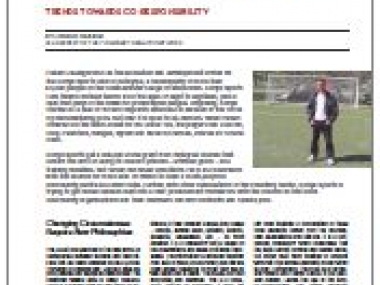Co-responsibility - a new relationship between local government and citizens
Edited on
09 October 2017Co-responsibility could be a solution to the new challenges traditional welfare states are facing today. The approach could answer the growing need for new types of services and innovative forms of service delivery. Jon Bloomfield, Lead Expert for the TOGETHER URBACT project tackles this issue in his recent article "![]() Download The Emerging Relationhips Between Councils and Citizens Thematic Paper (172.74 KB)".
Download The Emerging Relationhips Between Councils and Citizens Thematic Paper (172.74 KB)".

The co-responsibility approach is a philosophy based on the observation and ideas of citizens themselves. With this approach, councils, civic associations and citizens in their different shapes and roles – parents, service users, passengers, etc – all work together to define the best ways to improve service delivery of social or economic services. Eight European cities, inspired by this broad social thinking of the Council of Europe, developed in its Charter of Social Responsibility, have decided to develop together pilot actions based on such principles of co-responsibility in the URBACT project TOGETHER.
What is new with the co-responsibility approach?
Jon Bloomfield explains that first of all, it is a new way of listening to citizens, and second, it is a new way of involving them in the resolution of the main 'ill-being' factors they may face, through a grassroot, bottom up approach.
This partnership philosophy recognises that the state cannot provide and deliver alone but must work in partnership. Furthermore this must be a partnership where each player shares the decision-making.
To set up the possibility of partnership action, citizens are asked to give their opinions on the main reasons for their 'ill-being'. The information is gathered from sets of focus groups which ask citizens open-ended questions on what they see as well-being and ill-being. In the TOGETHER project, these answers were gathered through the URBACT Local Support Groups.
Pilot action to improve access to employment or to offer a better work life-family balance
In the framework of TOGETHER, partners developed pilot actions building on the principle of co-responsibility.
For instance, the city of Mulhouse (France) now runs a new project with citizens receiving minimum income, in which multistakeholder contracts are developed in order to change the relationship between the local authority, service delivery services and benefit claimants.
The objective is to tackle the issue of social inclusion from a perspective of partnership and reciprocity rather than the more traditional authority/client relationship.
The department worked together with 25 families, holding regular meetings with them, along with a theatre animateur and a psychologist over a three month period. At the end of the programme, half of the participants signed up to a 10 month programme of activity, organised around the issues of well-being/ill-being. At the end of the first programme, half of the participants had found a new job. The local authority decided to run a second pilot project with 17 families.
As well as improvement of individual users’ situations, the department hoped that the pilot projects would provide the local authority with better indicators to understand the situation of the precarious populations with whom they deal.
Other actions focus deal more directly with family and social issues. In Covilha (Portugal), in a project called A Centre of Time, a multipurpose community facility run by NGOs has been created, with some core funding of the municipality. The clear objective is to develop a new relationship with its key users. This centre provides services designed to help families reconcile the new time pressures of family life, work and leisure. It offers a wide range of services, from ironing, study support, after-school activities for children or multi-media training facilities, breaking the logic of services directed to only one client group.
The economic dimension of co-responsibility
According to Jon Bloomfield, these new approaches need not apply only to social and family questions, they can also relate to economic matters. For instance in Botkyrka (Sweden), the voluntary council of associations, local civic organisations and the council work on new ways to deal with the procurement of services. They define together new criteria for the contracting of local services such as the cleaning, catering and security of local community facilities and council buildings. The objective is for these services to be delivered more closely to the community they are designed to serve, with the expectation that locally based community organisations will then be in position to win the contracts.
Taking the co-responsibility mechanism forward
Jon Bloomfield says that beyond pilot actions, developing such projects should help re-shape the overall thinking of each municipality. For instance in Botkyra, the processes for community engagement are already well installed, but these new actions aim at strengthening them further. The TOGETHER project is a chance to inject new practices into these processes, and deepen the democratic engagement of the local community and its organisations.
Read more:
 Download The Emerging Relationhips Between Councils and Citizens Thematic Paper (172.74 KB) – URBACT Tribune PDF
Download The Emerging Relationhips Between Councils and Citizens Thematic Paper (172.74 KB) – URBACT Tribune PDF - TOGETHER – URBACT website
Submitted by admin on




